Brilliance Within Clunkiness: 6 Times When The Dialogue In The Star Wars Prequels Was Actually Great
It's far from Shakespeare, but it does have its moments.
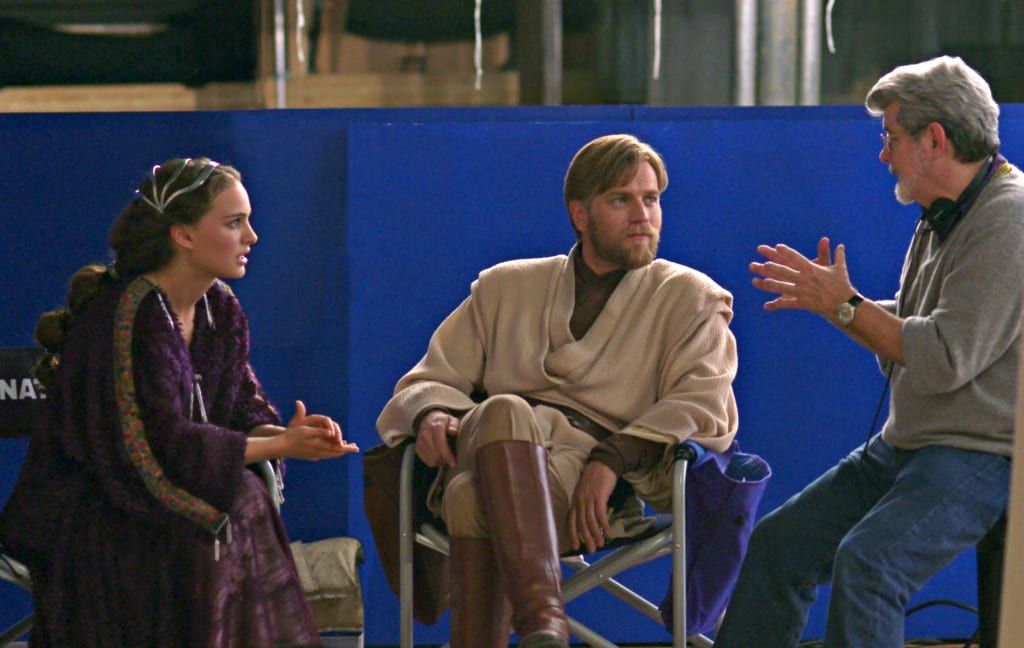
The fall of Anakin Skywalker and the Galactic Republic as depicted in the Star Wars prequels plays out like a true Shakespearean tragedy. Unfortunately, same can't quite be said about the dialogue within them. From the time when Anakin made his feelings about sand very clear to numerous other wooden lines, Lucas's dialogue stands as one of the key points of criticism many have towards these movies.
Now, this shouldn't be a surprise considering that we're talking about a guy who once described the act of scriptwriting as "bleeding on a page." Lucas has always been more of a visionary than a dramatist. However, that vision is undeniably brilliant and some of that brilliance did shine through into the dialogue as well. So, let's take a look at 6 examples when that was just the case.
6. Qui-Gon's Wisdom

'Star Wars: Episode I – The Phantom Menace' [Credit: 20th Century Fox]
Kicking things off with something simple yet profound, here're a few words of wisdom from Qui-Gon to Anakin after the latter is intially rejected by the Jedi Order:
Qui-Gon Jinn: I'm not allowed to train you, so I want you watch me and be mindful. Always remember, your focus determines your reality.
Thing is, not only is it a wonderful mantra for nowadays distraction-heavy world, but it's also a perfect way to contextualise the entire saga. You see, for Anakin, it was his lack of focus that enabled Obi-Wan to beat him on Mustafar and determined his reality in that torturous suit. For Luke, it was his ability to compose himself that stopped him following through with his anger and killing Vader. An act, which ultimately brought Vader's Anakin persona back.
5. Obi-Wan's Ego
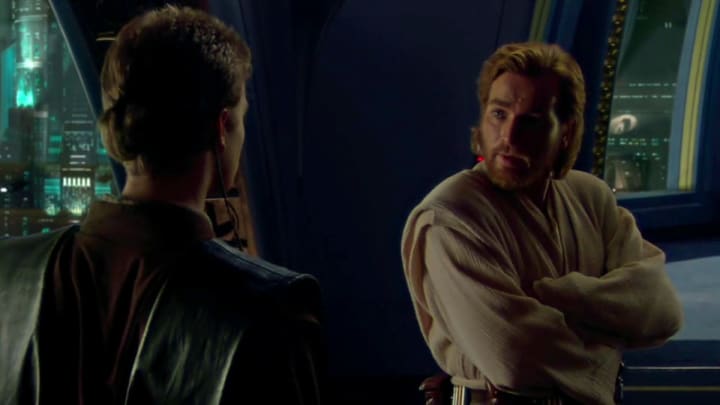
'Star Wars: Episode II – Attack of the Clones' [Credit: 20th Century Fox]
After being tasked to safe-guard Senator Amidala from further assassination attempts, Obi-Wan and Anakin engage in what must be their 1000th arguement by that point. This time it's over the best approach for protecting the Senator:
Obi-Wan Kenobi: You're using her as bait?Anakin Skywalker: It was her idea... Don't worry, no harm will come to her. I can sense everything going on in that room. Trust me.Obi-Wan Kenobi: It's too risky... besides, your senses aren't that attuned, young apprentice.Anakin Skywalker: And yours are?Obi-Wan Kenobi: Possibly.
Now, what's great here is that with just one word ("Possibly") Lucas manages to bring focus to what Obi-Wan himself was referring to in Return Of The Jedi when telling Luke of the over-confidence he had in his ability to train Anakin ("I thought that I could instruct him just as well as Yoda. I was wrong"). Think about it, here's a guy, who went from a Jedi Padawan into a Sith slayer, a Jedi Knight and a master to the propheciesed Chosen One literally within a span of few days. No matter how mentally strong you are, this has got to leave a mark on one's psyche.
So, while his wisdom and balance have righfully earned him the reputation as one of the all-time fictional mentors, it's also fascinating to see this other side to the iconic Jedi.
4. Dooku's Final Warning
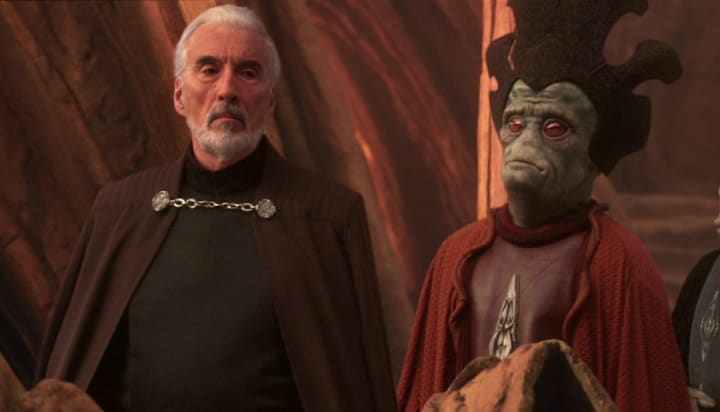
'Star Wars: Episode II – Attack of the Clones' [Credit: 20th Century Fox]
During the arena battle at Geonosis, as the droid army surrounds the survivng Jedi, Count Dooku a.k.a. Darth Tyranus makes one final plea to spare his former Jedi colleagues:
Count Dooku: Master Windu, you have fought gallantly. Worthy of recognition in the archives of the Jedi Order. Now... it is finished.
To understand what makes it such a perfect line, one must take into account Dooku's motivations. As we know, it was him who — after becoming disillusionised with the Jedi Order's indifference to the corruption in the Senate — comissioned the creation of the Clone army. It was also him who erased all traces of it from the Jedi Archives, thus leaving the Jedi clueless to what was going on right under their noses.
Now, it's fair to assume that pulling it off only confirmed Dooku's belief that the Jedi were completely out of touch with what was going on around them and doomed because of it. An assessment, which would prove to be a correct one, as it was the Jedi's lack of scepticism and vigilance to Palpatines dealings that led to their ultimate downfall. So, coming back to that confrontation at Geonosis, Dookus was not merely daunting the Jedi. It was also his final warning to his former allies that their complacency is going to cost them dear.
Have you ever heard the tragedy of Darth Plagueis The Wise? Of course you have, as this conversation between Anakin and Palpatine is not only one of the high-points of prequels but the entire saga. And, well, for a good reason. Simply put, what we have here is the ultimate proof that while Lucas might not be the best writer, he is certainly an amazing storyteller.
It's a story within a story, a myth within another myth all laid out just vaguely enough so that we could let our imagination fly, yet clearly enough to provide some fascinating insight into Palpatine's backstory and the overall lore.
2. The Death Of Liberty
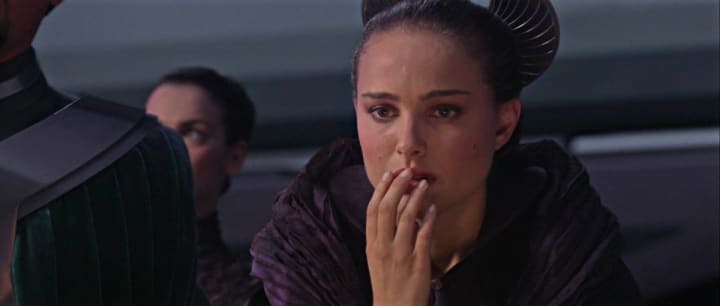
'Star Wars: Episode III – Revenge of the Sith' [Credit: 20th Century Fox]
Continuing with good ol' Sheev Palpatine, as he declares himself the ruler of the Galaxy, Senator Amidala is left to helplessly watch on as the Republic becomes an Empire:
Padme: So this is how liberty dies, with thunderous applause.
Now, obviously, this line is not included here because of it's hidden subtext. In that regard, it's really rather straight-forward, as it's simply Lucas's commentary on the birth of a totalitarian regime. Instead, what makes it great is how beautifully tragic it is. You see, while Padme is not exactly the most well-developed of characters, her faith in freedom and liberty are definitely well established. So, seeing her seeing witness it all crumble creates a powerful yet sombre culmination to the political storyline in the prequels.
1. Anakin's Dilemma

'Star Wars: Episode III – Revenge of the Sith' [Credit: 20th Century Fox]
While the idea of Anakin going down this dark path to save the one he loves was a smart one, it has often been criticised for bein too abrupt (he did go rather quickly from a conflicted hero to commiting genocide). And, well, while there probably should have been a much larger focus on Anakin's conflict between remining loyal to the Jedi vs giving himself to the Dark Side, there's actually a subtle yet clever build-up to the whole thing. For that let's explore three crucial pieces of dialogue from Revenge of the Sith.
First of, there's the moment when Dooku finds himself at Anakin's mercy as Palpatine watches on:
Supreme Chancellor: Kill him now.Anakin Skywalker: I shouldn't...Supreme Chancellor: Do it!Anakin Skywalker: [Anakin decapitates Dooku] I couldn't stop myself.Supreme Chancellor: You did well, Anakin. He was too dangerous to be kept alive.Anakin Skywalker: Yes, but he was an unarmed prisoner.[frees Chancellor Palpatine]Anakin Skywalker: I shouldn't have done that. It's not the Jedi way.
Now, as it happens towards the beginning of the film, these lines are essential for establishing two key points. First one is obviously that Anakin is drifting more and more towards the Dark side of the Force. However, perhaps more importantly, it also establishes that he still views the Jedi and their values as the moral high-ground (even though he had just failed to live up to it himself). Something, which is further solidified during the above-discussed opera scene, where he tells Chanchelor Palpatine the following:
Supreme Chancellor: Good is a point of view, Anakin. The Sith and the Jedi are similar in almost every way, including their quest for greater power.Anakin Skywalker: The Sith rely on their passion for their strength. They think inward, only about themselves.Supreme Chancellor: And the Jedi don't?Anakin Skywalker: The Jedi are selfless... they only care about others.
Therefore, when Anakin walks up to Windu, who is just about to kill Palpatine, the only thing that is keeping him from turning is the fact that he still views the Jedi as the "good guys". That, in turn, leads us to the most crucial exchange:
Mace Windu: [has Palpatine subdued] I'm going to put an end to this, once and for all!Anakin Skywalker: You can't. He must stand trial.Mace Windu: He has control of the senate and all the courts. He is too dangerous to be left alive!Supreme Chancellor: [exhausted and disfigured] But, I'm too weak. Don't kill me.Anakin Skywalker: That's not the Jedi way. He must live.[Windu ignores Anakin, still intending to kill Palpatine]
Now, when taking all the abovesaid into account, this proving to be Anakin's final tipping point makes perfect sense. In his eyes, Mace Windu's conduct effectively confirmed that the Jedi are no better than the Sith. And if they're no better, then there's no point in risking losing Padme just to remain loyal to them.
So, while there might not be much of dialogue dedicated to Anakin's struggle, the little that there is certainly achieves much.
Bottom Line
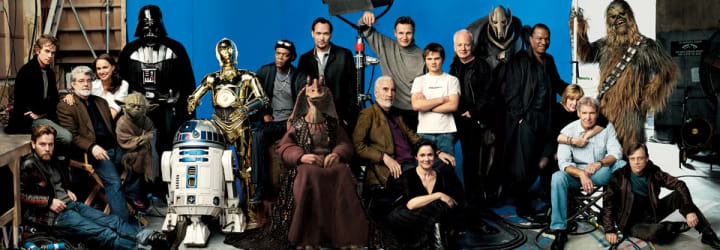
Credit: Vanity Fair
This little exploration is not supposed to convince anyone that dialogue in the prequels is good. It simply isn't. Also, it's not hard to imagine that had Lucas conceded writing duties to someone with a bit sharper pen (a'la The Empire Strikes Back) the prequels would be much more appreciated.
However, knowing Lucas's desire to bring his vision to life in as unaltered way as possible (something he couldn't quite do with the original trilogy), he was always going to write them. In that sense, the often clunky dialogue is a small price to pay for the amazing world building, fascinating philosophical themes and some memorable performances. Especially when it comes with a few clever bonuses, as we've just explored.
Sources: Imdb, George Lucas: A Life by Brian Jay Jones
About the Creator
Art-Peeter Roosve
So, to put it simply (and slightly cheesily) I'm fascinated with life. And, well, writing about films, TV shows, video games, music, travelling, philosophy and Formula 1 among other is a fun way to explore it.






Comments
There are no comments for this story
Be the first to respond and start the conversation.